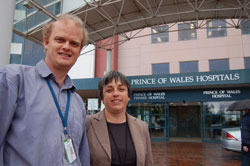The importance of hospital chaplaincy in this state has been recognised by the signing of a memorandum of understanding between NSW Health and the Civil Chaplaincies Advisory Committee of NSW.
The secretary of the CCAC (NSW), the Rev Graham McKay "” who is also assistant director of chaplaincy for Anglicare "” said chaplaincy providers such as Anglicare had been wanting a formal document for some time.
"The initiative for this came out of the concerns that arose over privacy issues a few years ago [such as chaplains being given patient lists]," he said. "It was those issues that began the dialogue between the CCAC and the department."
Mr McKay said the memorandum provided a clear understanding between chaplains and NSW Health "of the place chaplaincy has in the health system".
"It provides recognition for chaplaincy, much of which has gone below the radar in the past," he said. "In many cases there has been a lot of goodwill and hospitals have been grateful for what chaplains do" but in those few cases where there are issues, it's helpful to be able to go back to a document and say, "This is what the agreement is "” this is what's expected'."

An Anglican chaplain at the Prince of Wales Hospital, the Rev Tracey Sutherland (pictured), agrees. "It gives us a framework to work within… and it will standarise practice across hospitals. The executive of the Prince of Wales are very supportive of chaplaincy and we have great conditions of work, but that isn't universal across all hospitals."
The Director-General of NSW Health, Professor Debora Picone, said that further formalising the department's "strong relationship with chaplaincy and pastoral care services" reaffirms their valuable presence in our hospitals and the necessity of their ongoing role in providing holistic care to our patients and their families".
The department expects the memorandum will come into effect by the end of 2010.






















